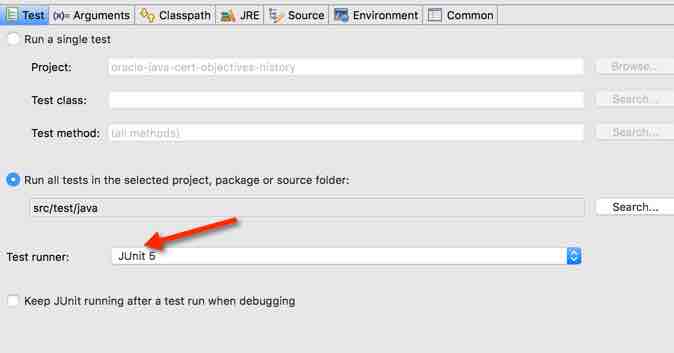I’ve been playing with JUnit 5 for a while. Since I’m going to be speaking about it at JavaOne, I decided to write all my tests using JUnit 5 between now and then. Plus we are getting close to JUnit 5’s official release; it’s pretty stable now.
Since it is more than just playing, I wanted my IDE to support it. And my Maven POM needed to know about both JUnit 4 and 5. It wasn’t hard.
Note if you are using IntellIJ, it works out of the box so you just have to set up Maven.
Update Eclipse
I also decided to update my Eclipse so I could run JUnit 5 tests in the workspace. I had to let Eclipse update 3 other plugins to be compatible with the latest version. It was easy to do though and I didn’t need to re-install my custom plugins. In September (or so), Eclipse will release with JUnit 5 support in it.
Update Maven POM
Then I updated my pom to use the dependencies in the JUnit 5 Maven sample. I also added failsafe support and junit-jupiter-params dependency (for parameterized tests which I use a lot)
<project xmlns="http://maven.apache.org/POM/4.0.0" xmlns:xsi="http://www.w3.org/2001/XMLSchema-instance" xsi:schemaLocation="http://maven.apache.org/POM/4.0.0 http://maven.apache.org/xsd/maven-4.0.0.xsd">
<modelVersion>4.0.0</modelVersion>
<groupId>GROUP_ID_GOES_HERE</groupId>
<artifactId>ARTIFACT_ID_GOES_HERE</artifactId>
<version>0.0.1-SNAPSHOT</version>
<properties>
<java.version>1.8</java.version>
<surefire.version>2.19.1</surefire.version>
<junit.version>4.12</junit.version>
<junit.jupiter.version>5.0.0-RC2</junit.jupiter.version>
<junit.vintage.version>${junit.version}.0-RC2</junit.vintage.version>
<junit.platform.version>1.0.0-RC2</junit.platform.version>
</properties>
<build>
<plugins>
<plugin>
<artifactId>maven-failsafe-plugin</artifactId>
<version>${surefire.version}</version>
<executions>
<execution>
<goals>
<goal>integration-test</goal>
<goal>verify</goal>
</goals>
</execution>
</executions>
<dependencies>
<dependency>
<groupId>org.junit.platform</groupId>
<artifactId>junit-platform-surefire-provider</artifactId>
<version>${junit.platform.version}</version>
</dependency>
</dependencies>
</plugin>
<plugin>
<artifactId>maven-compiler-plugin</artifactId>
<version>3.0</version>
<configuration>
<source>${java.version}</source>
<target>${java.version}</target>
</configuration>
</plugin>
<plugin>
<artifactId>maven-surefire-plugin</artifactId>
<version>${surefire.version}</version>
<configuration>
<includes>
<include>**/Test*.java</include>
<include>**/*Test.java</include>
<include>**/*Tests.java</include>
<include>**/*TestCase.java</include>
</includes>
<properties>
<!-- <includeTags>fast</includeTags> -->
<excludeTags>slow</excludeTags>
</properties>
</configuration>
<dependencies>
<dependency>
<groupId>org.junit.platform</groupId>
<artifactId>junit-platform-surefire-provider</artifactId>
<version>${junit.platform.version}</version>
</dependency>
</dependencies>
</plugin>
</plugins>
</build>
<dependencies>
<dependency>
<groupId>org.junit.jupiter</groupId>
<artifactId>junit-jupiter-api</artifactId>
<version>${junit.jupiter.version}</version>
<scope>test</scope>
</dependency>
<dependency>
<groupId>org.junit.jupiter</groupId>
<artifactId>junit-jupiter-params</artifactId>
<version>${junit.jupiter.version}</version>
<scope>test</scope>
</dependency>
<dependency>
<groupId>junit</groupId>
<artifactId>junit</artifactId>
<version>${junit.version}</version>
<scope>test</scope>
</dependency>
<dependency>
<groupId>org.junit.platform</groupId>
<artifactId>junit-platform-launcher</artifactId>
<version>${junit.platform.version}</version>
<scope>test</scope>
</dependency>
<dependency>
<groupId>org.junit.jupiter</groupId>
<artifactId>junit-jupiter-engine</artifactId>
<version>${junit.jupiter.version}</version>
<!-- docs don't have this as test scope; trying anyway to see what happens -->
<scope>test</scope>
</dependency>
<dependency>
<groupId>org.junit.vintage</groupId>
<artifactId>junit-vintage-engine</artifactId>
<version>${junit.vintage.version}</version>
<!-- docs don't have this as test scope; trying anyway to see what happens -->
<scope>test</scope>
</dependency>
<!-- other dependencies my project needs like selenium go here -->
</dependencies>
</project>
Problems I encountered (with solutions)
- Maven doesn’t run failsafe tests – Originally I didn’t have failsafe version 2.19.1 because I had copied the pom from the junit sample. And the JUnit sample didn’t have any integration tests so no reason to include failsafe.
- Eclipse doesn’t recognize migrated JUnit 5 tests – If you’ve ever run JUnit 4 tests against that project/test, Eclipse has a stored configure with the test runner set to JUnit 4. You can go to “run configurations” and either delete the existing configuration or change the runner to JUnit 5 for that configuration. I choose the later:

Remember that with this configuration, you are merely prepared to have JUnit 5 tests in your project. Since JUnit 5 is (mostly) backward compatible, the tests still work as is.

For intellij, see https://www.selikoff.net/2017/08/13/junit-5-and-intellij/
After migrating the tests to JUNit 5, I got rid of the JUnit 4 property and the two JUnit 4 dependencies.